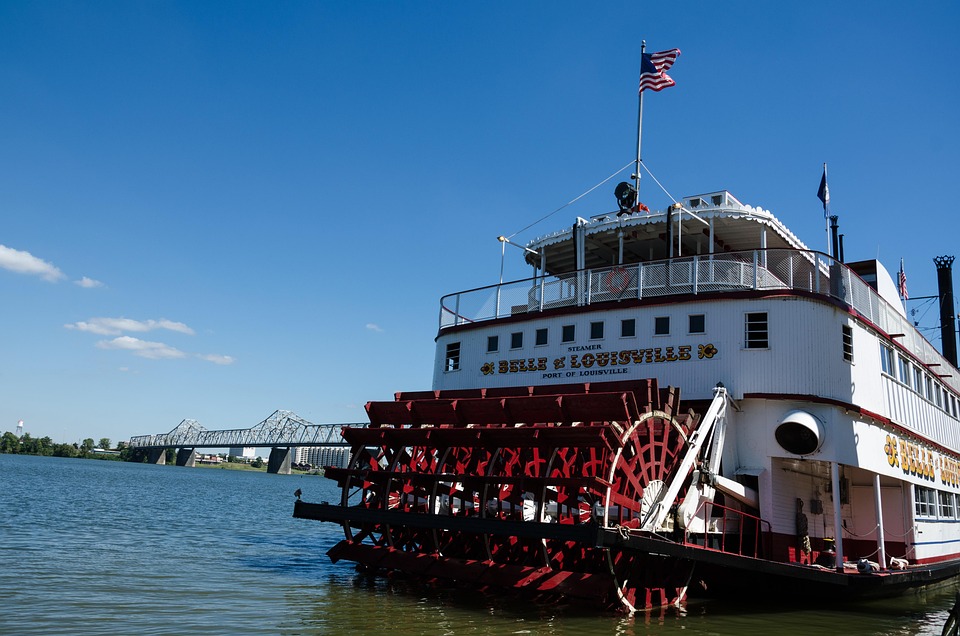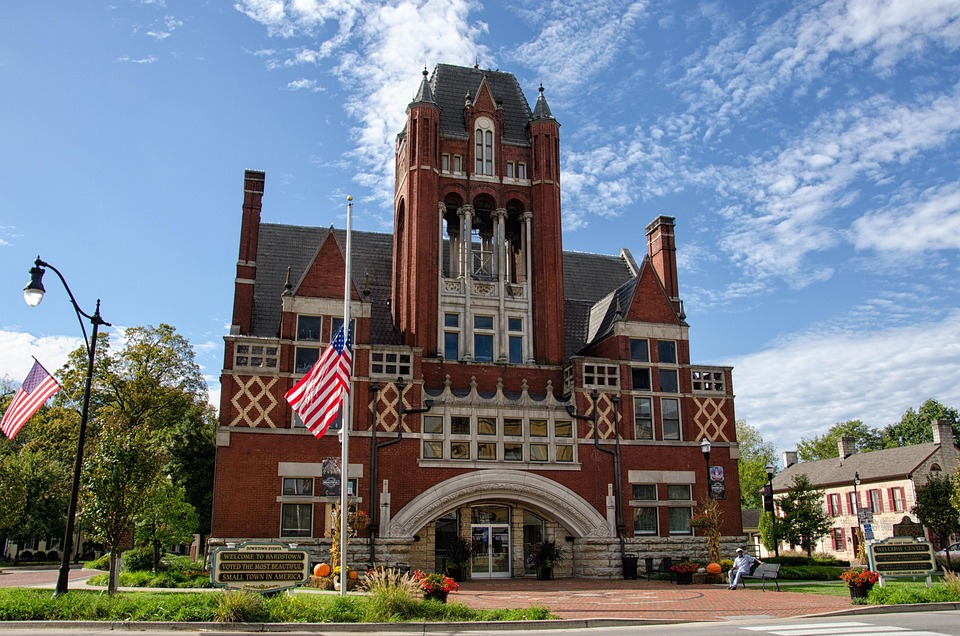Kentucky state (USA)
Kentucky is one of the most distinctive southern states in the U.S., blending unique traditions, rich history, picturesque landscapes, and a thriving modern economy. Let’s explore this region!
Location
The state of Kentucky is located in the east-central part of the United States, at the crossroads of the South and the Midwest. Its area covers approximately 104,659 km². It borders seven states: Indiana, Ohio, West Virginia, Virginia, Tennessee, Missouri, and Illinois.
State capital: Frankfort.
Largest cities: Louisville, Lexington, Bowling Green.
Geographically, Kentucky is divided into several regions, including the Jackson Purchase (Appalachian area), the western plains, and the famous Bluegrass region – known for its fertile lands, ideal for agriculture and horse breeding.
Climate and Landscape
Kentucky has a humid subtropical climate with mild winters and warm, humid summers.
- Average temperatures:
- Winter: from -2°C to +7°C.
- Summer: from +24°C to +32°C.
The state’s landscape is rich with rivers, hills, and plateaus. The Ohio River forms a natural northern boundary, while the Appalachian Mountains adorn the eastern part of the region.
Population
Kentucky is home to over 4.5 million residents, making it the 26th most populous state in the U.S. The population is unevenly distributed – most residents live in urban areas, such as Louisville and Lexington, while rural areas have significantly lower population density.
- Demographics:
- White: approximately 86%.
- African American: about 8%.
- Latino: around 4%.
- Asians and other ethnic groups: 2%.
Kentucky also hosts a Ukrainian diaspora, although it is smaller compared to states like Illinois or New York. Most Ukrainians settle in urban areas, particularly Louisville, where several Ukrainian cultural and religious organizations are active. These communities help preserve national traditions, organize festivals, and support newly arrived immigrants.
People in Kentucky are known for their hospitality, a hallmark of Southern states. Deep religious traditions also play a significant role in the region’s culture. The majority of residents identify with Protestantism, particularly Baptist denominations.

Crime
Crime rates in Kentucky are relatively low compared to the national average. According to FBI data, the rate of violent crimes in the state is 217 per 100,000 people, making it one of the safest states in the U.S.
However, crime levels can vary depending on the city or region. For example:
- Louisville has a higher crime rate compared to other cities in the state.
- Rural areas are generally safer and characterized by low crime rates.
Local firearm laws are relatively lenient, which also impacts safety dynamics. Nevertheless, following basic precautions and choosing safe neighborhoods for residence can help avoid undesirable situations.
Economy
The economy of Kentucky combines traditional industries, such as agriculture, with modern sectors like manufacturing, logistics, and technology. The state ranks 28th in GDP among U.S. states, which reflects a stable and diversified economy.
Key Sectors:
- Agriculture: Kentucky is renowned for its production of tobacco, corn, soybeans, as well as cattle and horse breeding. Bourbon whiskey, produced here, is considered a symbol of the state.
- Industry: Key sectors include automotive manufacturing, aerospace production, the chemical industry, and energy production.
- Tourism: Kentucky attracts tourists with its famous horse races, such as the Kentucky Derby, as well as its picturesque parks and cultural landmarks.
Minimum Wage: $7.25 per hour (federal rate), but companies in major cities often pay more due to competition for workers.
Poverty Rate: Around 16%, slightly above the U.S. national average.
Unemployment Rate: Approximately 4.5% as of 2023.

Kentucky for Business
The state is attractive for starting a business due to its low tax rates and availability of a workforce. Some of the main advantages include:
- Low Taxes: The corporate tax in Kentucky is only 5%, which is lower than the national average.
- Location: Kentucky’s location allows for efficient transportation of goods via key transportation corridors, including the Ohio River, interstate highways, and international airports.
- Business Support: The state actively encourages new investments through grants and incentives, particularly in manufacturing, energy, and IT sectors.
Notable Companies and Branches
- Ford Motor Company: Kentucky is home to two major Ford plants – the Kentucky Truck Plant and Louisville Assembly Plant, critical manufacturing facilities for the company in the U.S.
- Toyota Motor Manufacturing: The Georgetown plant is Toyota’s largest vehicle assembly facility outside Japan, employing thousands and producing popular car models.
- Amazon: Kentucky is a key hub for Amazon’s logistics network, with several large warehouses and distribution centers.
- UPS (United Parcel Service): Louisville International Airport hosts UPS Worldport, one of the largest logistics hubs in the world.
- Beam Suntory: This leading bourbon producer, responsible for brands like Jim Beam and Maker’s Mark, has major production facilities in Kentucky.
- Lexmark International: A global provider of printers and software with its headquarters in Lexington.
Tax Conditions for Business
- Corporate Tax: A flat rate of 5%, making the state highly attractive for companies looking to minimize costs.
- Sales Tax: A 6% rate that does not vary by county or city, simplifying financial planning for businesses.
- Property Tax: Kentucky has one of the lowest commercial property tax rates in the U.S., a significant advantage for new developments.
- Investment Credits: The state provides incentives for businesses that create new jobs or innovate, including reduced rates and access to grants.
Potential Challenges and Risks
- Skilled Workforce: While the state offers access to a large pool of workers, certain industries, especially tech, face a shortage of specialists. This may require additional spending on training or recruitment from other regions.
- Infrastructure Challenges: Although the transport network is well-developed, rural areas may lack adequate infrastructure, complicating expansion beyond urban centers.
- Economic Competition: The presence of major corporations like Amazon and UPS can make it difficult for small and medium-sized businesses to compete for resources and labor.
- Reliance on Traditional Industries: Kentucky’s economy is heavily dependent on agriculture, bourbon production, and manufacturing, making it vulnerable during downturns in these sectors.
Business Advantages
- Low tax rates.
- Strategic location with access to transportation corridors and large markets.
- Active support for startups through grants and state programs.

Real Estate
The real estate market in Kentucky offers a wide range of options for both renters and buyers. Compared to other U.S. states, the region maintains relatively affordable prices, making it attractive for young families, investors, and those seeking a new place to live.
The average rental price in Kentucky varies by location:
- Louisville: Rent for a one-bedroom apartment ranges from $800 to $1,200 per month.
- Lexington: Similar housing costs between $850 and $1,300 per month.
- Smaller towns: In cities like Bowling Green, rents start from $600 to $900.
Thanks to affordable housing costs, many renters can afford spacious homes with multiple bedrooms, especially in suburban areas.
The average cost of a house in Kentucky is about $210,000, significantly below the U.S. average of approximately $390,000. This makes it favorable for purchasing homes both for living and for investment purposes. Homes in rural areas with large plots of land are particularly popular.
Commercial Real Estate Market
- The cost of commercial real estate is also attractive. Average prices for offices and warehouses are much lower than in neighboring states like Ohio or Tennessee.
- Logistics centers near UPS Worldport or Amazon are popular among investors looking for ready infrastructure for business.
Ecology
Kentucky is a state rich in natural resources and landscapes, but it also faces environmental challenges related to industrial and agricultural development. The state actively works to improve its ecological situation through conservation programs and the adoption of green technologies.
Natural Advantages
- Forests and Parks: Approximately 47% of the state is covered by forests. Notable areas include the Daniel Boone National Forest and Mammoth Cave, the world’s largest cave system and a UNESCO World Heritage Site.
- Rivers and Lakes: The Ohio River forms Kentucky’s northern border, and reservoirs like Kentucky Lake are popular spots for recreation and fishing.
- Biodiversity: The state boasts unique ecosystems home to numerous plant and animal species characteristic of the Appalachian region.
[Search photo: “Forests and Mammoth Cave in Kentucky”]
Environmental Challenges
- Industrial Pollution:
- Automotive, chemical, and oil refining industries contribute to greenhouse gas emissions.
- The state’s heavy reliance on coal-based energy raises concerns about air and water quality.
- Agriculture:
- The use of pesticides and fertilizers sometimes leads to soil and water contamination.
- Flooding: The river systems and susceptibility to heavy rainfall make flooding one of the state’s major risks.
Landmarks
Kentucky is a treasure trove of cultural, natural, and historical landmarks that attract tourists from all over the world. Among the state’s natural wonders, Mammoth Cave stands out as the world’s largest cave system, astonishing visitors with its size and unique geological formations. This UNESCO World Heritage Site is one of the most popular tourist destinations in the region.
The state’s history comes alive in places such as the site of the Battle of Perryville, a pivotal moment in the U.S. Civil War. Museums and historical complexes in Kentucky offer a glimpse into the state’s past, highlighting its struggle for independence and its development over the centuries.
Horse enthusiasts will find paradise in Kentucky, home to the world-famous Kentucky Derby held annually. This event is not just a sporting spectacle but also a cultural phenomenon celebrated with grand parties and traditions. Visitors should also explore the Kentucky Horse Park, which showcases the history and culture of equestrian sports.
For nature lovers, the state offers countless opportunities for outdoor activities. The Appalachian Mountains in eastern Kentucky are perfect for hiking, climbing, and camping, while reservoirs such as Kentucky Lake provide excellent conditions for fishing, boating, and family recreation.
Urban centers like Louisville and Lexington also have plenty to offer. Louisville is known for the Muhammad Ali Center and its vibrant festivals showcasing the rich culture of the South. Lexington, nicknamed “The Horse Capital of the World,” charms visitors with its picturesque landscapes, excellent cuisine, and welcoming atmosphere.
Kentucky is a state that seamlessly blends nature, history, sports, and hospitality, offering a unique experience to everyone who visits.
Why People Move to Kentucky
Kentucky attracts newcomers with its affordable lifestyle, natural beauty, and cultural traditions. For many, the state represents a place of tranquility, reasonable housing costs, and the warm atmosphere typical of southern states.
One of the main reasons for moving to Kentucky is its affordable housing. The cost of homes and rentals is significantly lower than in many other U.S. regions, making it appealing for middle-income families, young professionals, and retirees. At the same time, residents have the option to live in larger cities like Louisville or Lexington, quiet suburbs, or rural areas.
Additionally, many people relocate for job stability and accessibility. Kentucky offers employment opportunities in agriculture, manufacturing, logistics, and trade. Toyota and Ford factories, along with UPS’s logistics hub, provide thousands of jobs for locals.
Kentucky’s rich nature also attracts those who appreciate life away from the hustle and bustle of major cities. Residents enjoy the chance to spend time outdoors, whether it’s in the Appalachian Mountains or near the state’s many rivers and lakes. For many, this is a key factor, as the environment is perfect for active recreation and family leisure.
Cultural and historical diversity further enhances the state’s appeal. People who move here value Kentucky’s rich heritage, blending southern traditions, famous horse racing events, and modern living.
However, Kentucky poses some challenges for newcomers. Some might need to adjust to the relatively slower pace of life. Rural areas, while charming, may lack the level of infrastructure found in urban settings. Additionally, the economy’s reliance on traditional industries means that the job market may be limited for those seeking work in high-tech fields.
Overall, Kentucky offers a unique combination of comfort, affordability, and culture that attracts residents from across the U.S.
What Else Should Newcomers Know About Living in Kentucky?
Kentucky is a unique state with a rich history, distinct social norms, and local traditions that may surprise newcomers. In addition to general living conditions, there are specific aspects worth considering to adapt quickly and feel part of the community.
Interesting Facts
One of the most famous events in Kentucky is the Kentucky Derby, held every May. It’s not just a sporting event but a grand cultural celebration featuring parties, fancy hats, and traditional cocktails like the Mint Julep. Participating in Derby Day festivities is almost a must for residents.
Kentucky is also the birthplace of bourbon, with over 95% of the world’s supply produced here. For bourbon enthusiasts, the Bourbon Trail is a popular tourist route that includes visits to legendary distilleries like Maker’s Mark and Jim Beam.
Curious Laws
Some state laws may seem quirky to newcomers. For instance, it’s illegal in Kentucky to dye ducks blue and sell them individually – they must be sold in pairs.
Another intriguing regulation concerns alcohol sales: in certain areas known as “dry counties,” the sale of alcohol is completely prohibited. Even in “wet” counties, restrictions may apply on weekends or during specific events.
Unwritten Social Rules
Locals value peace and politeness. For example, drivers in Kentucky often stop to let others merge or cross, and strangers greet each other in stores or parks.
Residents of rural areas take great pride in their way of life, and newcomers should respect this lifestyle. Loud parties in rural areas, for instance, might cause dissatisfaction among neighbors, even if they’re located far apart.
Another key aspect is the love of nature and traditional activities. On weekends, many families visit local farmers’ markets, spend time outdoors, or participate in hunting or fishing, which are considered not just hobbies but cultural staples.
Infrastructure and Habits
While public transportation is available in larger cities like Louisville and Lexington, most people in Kentucky rely on personal vehicles. This is due to the significant distances between settlements and the limited availability of transport routes in rural areas.
Overall, life in Kentucky moves at a slower pace, which can be a major advantage for those seeking peace and distance from the hustle and bustle of metropolitan areas. However, newcomers should consider that adapting to this lifestyle may take some time.
Table of Contents